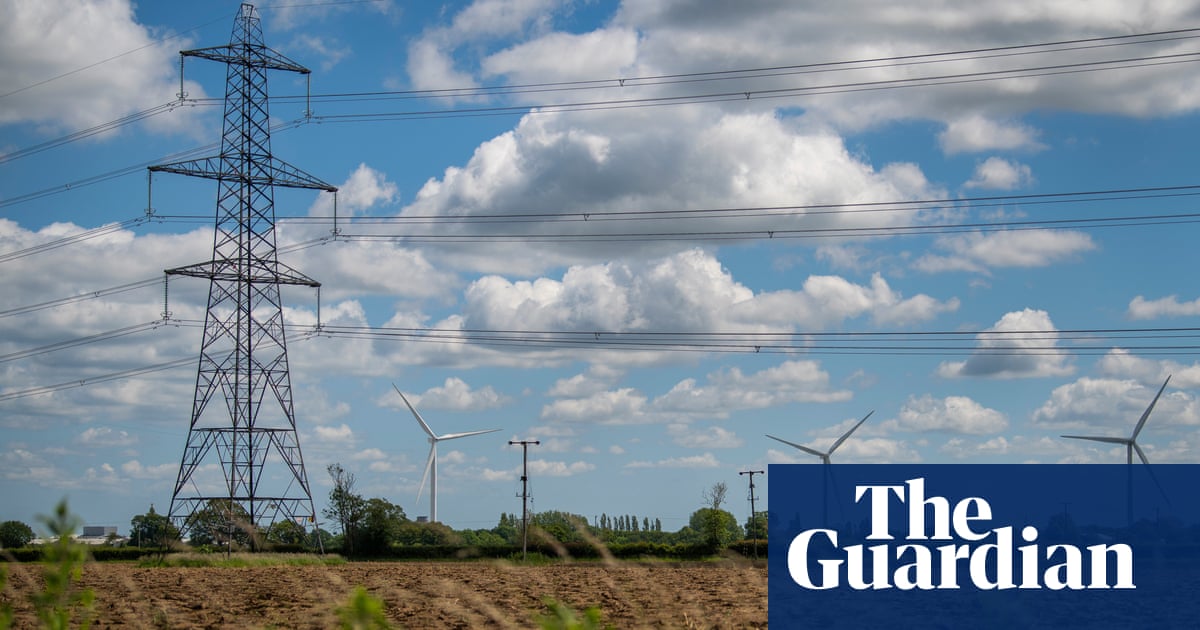The prospect of pylons, wind turbines and solar farms springing up across the countryside has upset a number of UK communities. But the head of Energy UK, Emma Pinchbeck, believes there is a way to decarbonise our electricity and sooth these tensions.
Pinchbeck is tapped to be the next leader of the Climate Change Committee, and currently represents the industry charged with decarbonising the grid at the cheapest and fastest rate possible.
But she understands why many feel resistance to the idea of changing the countryside: she lives in the Cotswolds, in an area of outstanding natural beauty (AONB). “I’m the 10th generation of my family to come from this land. My granny’s brothers all farmed it. I intellectually understand that tackling climate change is about largely other parts of the world that will be much more impacted than I will be, or this landscape will be. But emotionally, I have a very strong conservative instinct that I don’t want this landscape to change, and I want to hand it to my children.”
As the energy secretary, Ed Miliband, unblocks the planning system to allow onshore wind and solar to be built, after de facto bans put in place by previous Conservative governments, these are feelings many in the countryside have. But if Labour is to carry out its plans to make the UK’s energy clean and reach net zero by 2030, these fears will have to be somehow assuaged.
“Change can be quite frightening,” says Pinchbeck, “and there is this kind of national romance about British identity and green and pleasant lands and that kind of countryside. I think you’ve got to reach people emotionally and not try to tell them that is a stupid instinct.”
Instead it’s important to work with community groups to find out if there is a way they can accept this change, and to understand that the energy sector and government aren’t “taking the mickey”.
“It’s not just that we’re just going to build as much infrastructure as fast and as selfishly as possible,” she said. “You’ve got to convince people that you’re doing the minimum amount that you truly need.”
Community benefits are also being mooted, which means cutting bills for those most affected by infrastructure to create and disperse green energy, or funding sports halls or other services in the affected area.
“We really support that,” said Pinchbeck. “I think the nature of the energy transition is there will be some places where there’s more infrastructure than others, because you go where the resources are. The east coast is an example. Scotland is an example. Where you’re asking people to host a load of infrastructure for other parts of the country to benefit from cheaper energy bills, you can acknowledge that they are carrying more responsibility for the transition.”
Some energy companies are already doing this, including RES group and Octopus. If local communities support a windfarm, they can get discounts on their bills. Octopus says this scheme has led to people asking for turbines to be built in their area, so they can benefit.
At least two of the candidates for the Tory leadership have also taken up positions on the issue. Priti Patel has campaigned against the loosening of the planning system, while her opponent Robert Jenrick has said the country should go slower in meeting net zero.
after newsletter promotion
Pinchbeck said: “There’s no doubt that energy is politicised in a way that few other areas of the economy are. And I know that because one of my jobs at Energy UK is to talk to the leads of other trade bodies. They’re baffled by the relationship we have with politics and the media.”
The less renewable energy is politicised the better, she argues, pointing to the rising populism in the US. “There’s a risk of that being imported to the UK, and that would be a real tragedy, because the energy sector and the private utilities I work for want to [bring in clean energy] regardless of climate change; we just think the technology is better. It’s better for bill payers. It’s better for the economy. We are in a race with every other economy around the world, including China, to get this stuff here.”
“In my current job, investment for the last five years has been absolutely critical for us, and we are in competition with other markets, and our investors do read headlines.” So, she says, “when you get net zero scepticism in politics, that often manifests in my world as investors getting nervous about the UK.” The energy sector “just wants to get this [the green transition] done”.
Whereas taking things more slowly will have costs. “If you do more deliberative comms and you put extra steps in the planning process, then you slow those processes down. If you ask industry to bury cables or do them offshore, rather than do them in a straight line, there is a benefit to that community aesthetically, and that solves the one problem, but there’s an extra cost for everyone else on the bills. So there is nothing that is a free pass.”
The critical point in danger of being lost, she argues, is that everyone will benefit if cheap, clean energy is built and if climate impacts, which will ultimately be more destructive to the countryside than pylons, are minimised.
